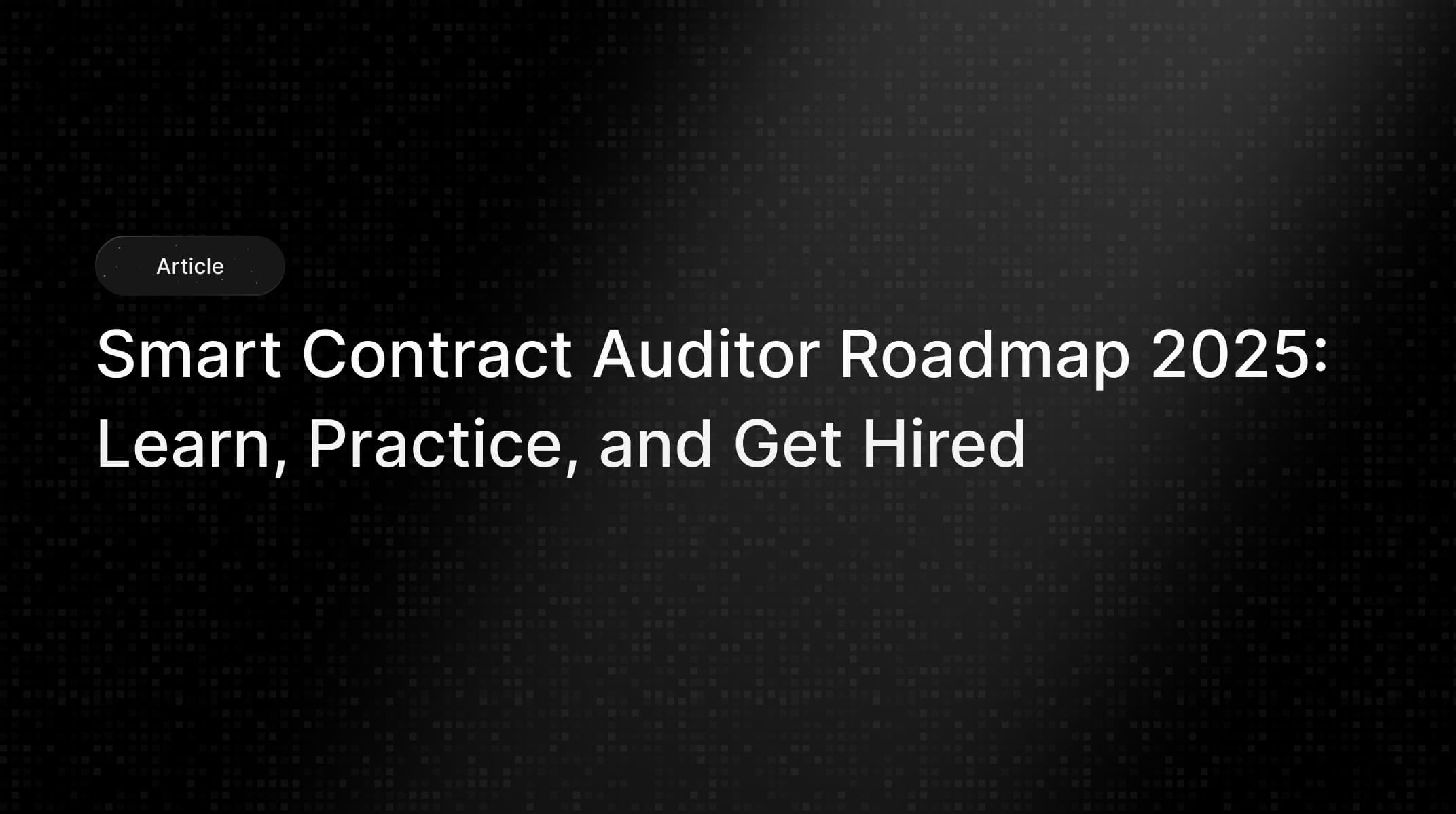October 21, 2025
Updated: October 21, 2025
A complete beginner-to-expert roadmap to become a blockchain and Web3 smart contract auditor from Solidity to real audits, bug bounties, and CTFs.
Daoud Youssef

The world is quickly transitioning toward a decentralized economic model. Traditional financial systems depend on centralized authorities such as banks and institutions, which creates a single point of failure. If that authority is hacked, corrupted, or pressured, the entire system can collapse because all control and decision-making are concentrated. Blockchain technology solves this by distributing trust, and along with it comes new roles like smart contract developers and auditors. Developers build the logic, while auditors review and secure it before or after deployment. This roadmap will guide you through the steps needed to become a smart contract auditor.
If you do not enjoy programming or lack solid knowledge of at least one programming language, this field may be a challenge and maybe you are in the wrong place here . Smart contract auditing is based on reading, understanding, and analyzing code every rule on the blockchain is enforced programmatically rather than manually.
This guide starts from the basics and gradually moves toward advanced auditing concepts. The roadmap is organized into stages to help you track your progress effectively.
Web2 is the current version of the internet built around centralized platforms such as Google, Facebook, and YouTube. These companies collect, store, and control user data. In contrast, Web3 relies on blockchain technology and introduces decentralization, where users own their assets and identities through wallets and smart contracts. Applications built in Web3 are called dApps and operate on public networks, promoting transparency and censorship resistance.
Blockchain technology began with the launch of Bitcoin in 2008 by Satoshi Nakamoto. It was designed as a decentralized currency that removes the need for banks. In 2015, Ethereum expanded on this concept by introducing programmable smart contracts, transforming blockchains from simple ledgers into powerful platforms for decentralized applications across various industries.
For a detailed explanation of blockchain mechanics, you can review this helpful article:
https://www.geeksforgeeks.org/ethical-hacking/how-does-the-blockchain-work/
Decentralization distributes authority across many participants rather than a single controlling entity. This enhances transparency and security while eliminating single points of failure. Users interact directly with systems through cryptographic proof and consensus rather than relying on institutional trust.
To understand the technical differences between Ethereum and Bitcoin in more detail, read Chapters 1–3 of the following free resource:
https://github.com/ethereumbook/ethereumbook
A smart contract is a self-executing program stored on a blockchain. It automatically runs when predefined conditions are met, removing the need for intermediaries. Because the code is transparent and tamper-proof, the contract behaves exactly as written once deployed.
Solidity is the most widely used language on Ethereum and is similar to JavaScript. Vyper is another Ethereum language with a Python-like structure, focusing on simplicity and security. Rust is used on chains like Solana and NEAR due to its strong performance and safety features. This roadmap focuses on Solidity since it dominates the ecosystem.
Start by learning:
Recommended beginner course for the great person Patrick Coolins (free):
https://updraft.cyfrin.io/courses/solidity
Intermediate topics:
Advanced topics:
Advanced courses:
https://updraft.cyfrin.io/courses/foundry
https://updraft.cyfrin.io/courses/security
Important Steps to Become a Skilled Auditor
Recommended DeFi books:
Beginner: https://landing.coingecko.com/how-to-defi/
Advanced: https://www.amazon.com/How-DeFi-Advanced-Coin-Gecko/dp/B098H215P3
at least you should read the beginner book
Study technical standards(very important):
EIP-20 https://eips.ethereum.org/EIPS/eip-20
EIP-721 https://eips.ethereum.org/EIPS/eip-721
Understand proxy architecture:
https://docs.openzeppelin.com/contracts/4.x/api/proxy

Stay secure with DeepStrike penetration testing services. Reach out for a quote or customized technical proposal today
Contact Us